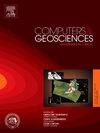A reverse tracing of the water flow path algorithm for slope length extraction based on triangulated irregular network
IF 4.2
2区 地球科学
Q1 COMPUTER SCIENCE, INTERDISCIPLINARY APPLICATIONS
引用次数: 0
Abstract
Terrain factor is an important factor affecting soil erosion, in which slope length is an important indicator of terrain factor. In this paper, we model the regional topographic relief with triangulated irregular network TIN, use the slope aspect of the TIN triangular surface to determine the flow direction, and propose an algorithm (RT-WFP) for extracting the slope length by tracing the water flow trajectory in reverse direction. The slope cutoff point rule is set in the algorithm to improve the accuracy of the slope length extraction results. We calculated the slope length of the experimental area of the small watershed of Golden Hook-shaped collapsing hill in Bailu Township, Ganxian District, and the rationality of the algorithm proposed in this paper is verified through the comparison and analysis with the traditional slope length extraction algorithm. The experimental results show that, compared with the traditional D8 algorithm, the water flow path extracted by this algorithm in the experimental area more closely matches the water flow path based on contour mapping, and the slope length extracted by this algorithm has a lower sensitivity to the resolution of the data, and the percentage of cells with a slope length value of no more than 300 m (the limit standard of the RUSLE model) at a resolution of 30 m reaches 94.19%.
基于三角形不规则网络的坡长提取水流路径反向追踪算法
地形因素是影响水土流失的重要因素,其中坡长是地形因素的重要指标。本文利用三角形不规则网络 TIN 对区域地形起伏进行建模,利用 TIN 三角形面的坡度来确定水流方向,并提出了一种通过反向追踪水流轨迹来提取坡长的算法(RT-WFP)。算法中设置了坡度截点规则,以提高坡长提取结果的准确性。我们计算了赣县白鹿镇金钩形塌陷山小流域实验区的坡长,通过与传统坡长提取算法的对比分析,验证了本文提出的算法的合理性。实验结果表明,与传统的 D8 算法相比,该算法在实验区提取的水流路径与基于等高线图的水流路径更加吻合,且该算法提取的坡长对数据分辨率的敏感性更低,在分辨率为 30 m 时,坡长值不大于 300 m(RUSLE 模型的极限标准)的单元占比达到 94.19%。
本文章由计算机程序翻译,如有差异,请以英文原文为准。
求助全文
约1分钟内获得全文
求助全文
来源期刊

Computers & Geosciences
地学-地球科学综合
CiteScore
9.30
自引率
6.80%
发文量
164
审稿时长
3.4 months
期刊介绍:
Computers & Geosciences publishes high impact, original research at the interface between Computer Sciences and Geosciences. Publications should apply modern computer science paradigms, whether computational or informatics-based, to address problems in the geosciences.
 求助内容:
求助内容: 应助结果提醒方式:
应助结果提醒方式:


